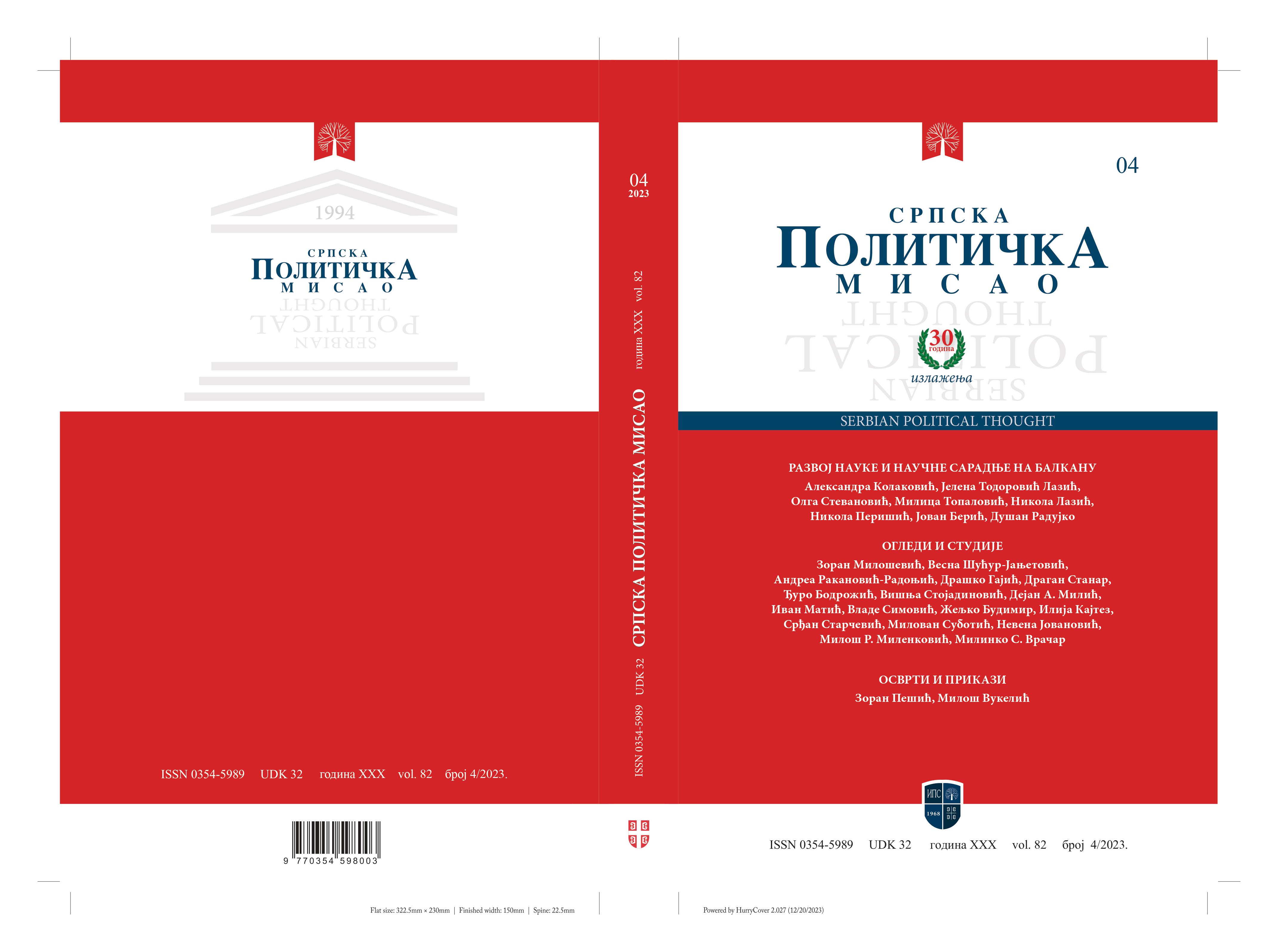ДАЈУ ЛИ ЉУДСКА ПРАВА МОГУЋНОСТ ЗА ОСНАЖИВАЊЕ ДРУШТВЕНО ОСЈЕТЉИВИХ ГРУПА У СОЦИЈАЛНОМ РАДУ У РЕПУБЛИЦИ СРПСКОЈ?
Sažetak
Vulnerable groups represent special categories that are in a higher risk of being socially excluded, vulnerable and sensitive to spectrum of risks, including poverty. Disabled persons, children, youngsters, women, elders, victims/survivors of violence, illiterate people, people living in rural areas, members of certain minority groups, refugees and displaced persons, members of LGBTIQ+ communities etc, are considered to be vulnerable.
Human rights as a universal concept are guaranteed by the Constitution of Bosnia and Herzegovina (BiH), which guarantees the implementation of human rights for all citizens of BiH. The obligation to implement the international documents that secure the standards, obliging the state to enforce guaranteed human rights is also anticipated by the Constitution. Human rights are the foundation and the framework for social work and social policy when it comes to working with and in favour of vulnerable groups, however, in reality of social work practice, these groups remain on the margins of society.
This article focuses on possibilities of social work in helping vulnerable groups to move from the margins of society. The article represents the results of the analysis conducted on gathered relevant documents that include information regarding the current state and processes, status and changes regarding the vulnerable groups’ human rights enforcement in Republic of Srpska. The theoretical framework used for understanding and trying to search for possible answers to the defined question is underpinned by the critical social work perspectives. The content analysis was used as an independent theoretical-empirical method when research on relevant documents was conducted.
Reference
Baines, D. 2007. “Anti-oppressive social work practice: Fighting for space, fighting for change”. In Doing anti-oppressive practice: Building transformative politicized social work “ eds D. Baines. Halifax, NS: Fernwood Publishing.
Baines, D. 2017. Doing Anti-Oppressive Practice: Social Justice Social Work. Blackpoint, Nova Scotia: Fernwood Publishing.
Bodrožić, Đ. 2023. “Улога државе у обликовању и заштити национлног идентитета“. Srpska politička misao, 80(2), 97-113.
Chenoweth, L. McAuliffe, DA. 2011. The road to social work and human service practice 3rd ed. London: Cengage Learning.
Creswell, JW. 2002. Research design: Qualitative, quantitative, and mixed methods approaches. London: Sage.
Ćuk, M. and Savović, I. 2019. “Socijalni rad u svakodnevnoj praksi socijalne zaštite Republike Srpske”. Politeia, God.9, br.17:57-80.
DuBois, B. and Miley, K. 2005 Social work: An empowering profession. 5th ed. Boston: Allyn & Bacon.
Ferguson, H. 2008. “Liquid social work: Welfare interventions as mobile practices”. British Journal of Social Work, 38(3), 561-579.
Đurić, M. and Stojanović, Đ. 2020. “Niklas Luhmann’s social systems theory: The issue of subsystem autonomy”. Serbian Political Thought, (4), 151-170.
Fook, J. 2023. Social Work: A Critical Approach to Practice. 4rd ed. London: Sage.
Fook, J. and Morley. C. 2005. “Empowerment: a contextual perspective”. In Hick J, Fook J and Pozzuto (eds.), Social Work: A Critical Turn. Toronto: Thompson Educational Publishing. Pp.67-86.
Gajić, D. 2020. Nezaposlenost i politika zapošljavanja u Republici Srpskoj. Doktorska disertacija. Banjaluka: Univerzitet u Banjoj Luci, Fakultet političkih nauka, Studijski program socijalni rad.
Gavrilović, A. and Jugović, A. 2012. “A comparative study of child welfare in Serbia, Croatia and Bosnia-Herzegovina”. Srpska politička misao, (1), 251-272.
IFSW International Federation of Social Workers https://www.ifsw.org/
Ife, J. 2008. Human rights and social work practice: Towards human rights practice (rev.ed.). Cambridge, UK: Cambridge University Press.
Mullaly, B. 2007. The New Structural Social Work. 4thed. Ontario: Oxford University Press.
Mullaly, B. 2010. Challenging Oppression and Confronting Privilege. 2nd ed. Ontario: Oxford University Press.
Muratbegović, E. 2017. Socjalna i ljudska prava ranjivih grupa – priručnik za profesionalce, Sarajevo: GIZ –GmbH.
Pease, et al. 2009. Critical Social Work: Theories and Practicee for Socially Just World, edited by Linda Briskman, Taylor & Francis Group.
Pease, et al. 2016. Doing critical social work: Transformative practice for social justice, Griffin Press.
Pease, B. and Fook, J. 1999. Postmodern critical theory and emancipatory social work practice. In B. Pease & J. Fook (Eds.), Transforming social work practice: Postmodern critical perspectives (pp.1-22). St. Leonards, Australia: Allen & Unwin.
Petković, B. and Kodovšek, N. 2011. O diskriminaciji - priručnik za novinarke i novinare, Sarajevo: Fondacija Mediacentar.
Socijalna uključenost u Bosni i Hercegovini – Nacionalni izvještaj o humanom razvoju za 2020 godinu, 2021. UNDP, Sarajevo.
Stojiljković, Z. 2018.”Трактат о социјалној правди и правичности”. Српска политичка мисао, (1), 41-58.
Republički zavod za statistiku/Republic of Srpska Institute of Statistic, 2021. Žene i muškarci, Banjaluka
Tew, J. 2002. “Going social: championing a holistic model of mental distress within professional education”. Social Work Education, 21(2), 143-155.
UNICEF BIH 2017. Situaciona analiza djece sa poteškoćama u Bosni i Hercegovini, Sarajevo.
Ustav Bosne i Hercegovine 2009. „Službeni glasnik BiH“ br. 25/09.
Ustav Republike Srpske 2005. „Službeni glasnik Republike Srpske“ br.: 21/98, 28/94, 8/96, 13/96, 15/96, 16/96, 21/96, 21/02, 26/02, 30/02, 31/02, 69/02, 31/03, 98/03, 115/05, 117/05.
Vlada Republike Srpske/Government of Republic of Srpska 2020. Strategija socijalne uključenosti Republike Srpske 2021 – 2027. UNICEF.
Zakon o dječijoj zaštiti 2017. „Službeni glasnik Republike Srpske“, br.:114/17, 122/18, 107/19 i 119/21.
Zakon o ravnopravnosti polova u Bosni i Hercegovini 2010. „Službeni glasnik BiH“ br.:32/10.
Zakon o socijalnoj zaštiti Republike Srpske 2012. „Službeni glasnik Republike Srpske“ br.: 37/12, 90/16, 94/19, 41/20 i 32/22.
Zakon o zabrani diskriminacije 2009. „Službeni glasnik BiH“ br.: 59/09.
Zakon o zaštiti od nasilja u porodici2012. „Službeni glasnik Republike Srpske“, br.: 102/12, 108/13, 82/15 i 84/19.
Zlatanović, S. 2021. “Alternative care for children in social welfare system – Policy and legal challenges”. Serbian Political Thought. 74(4), 135-153.

